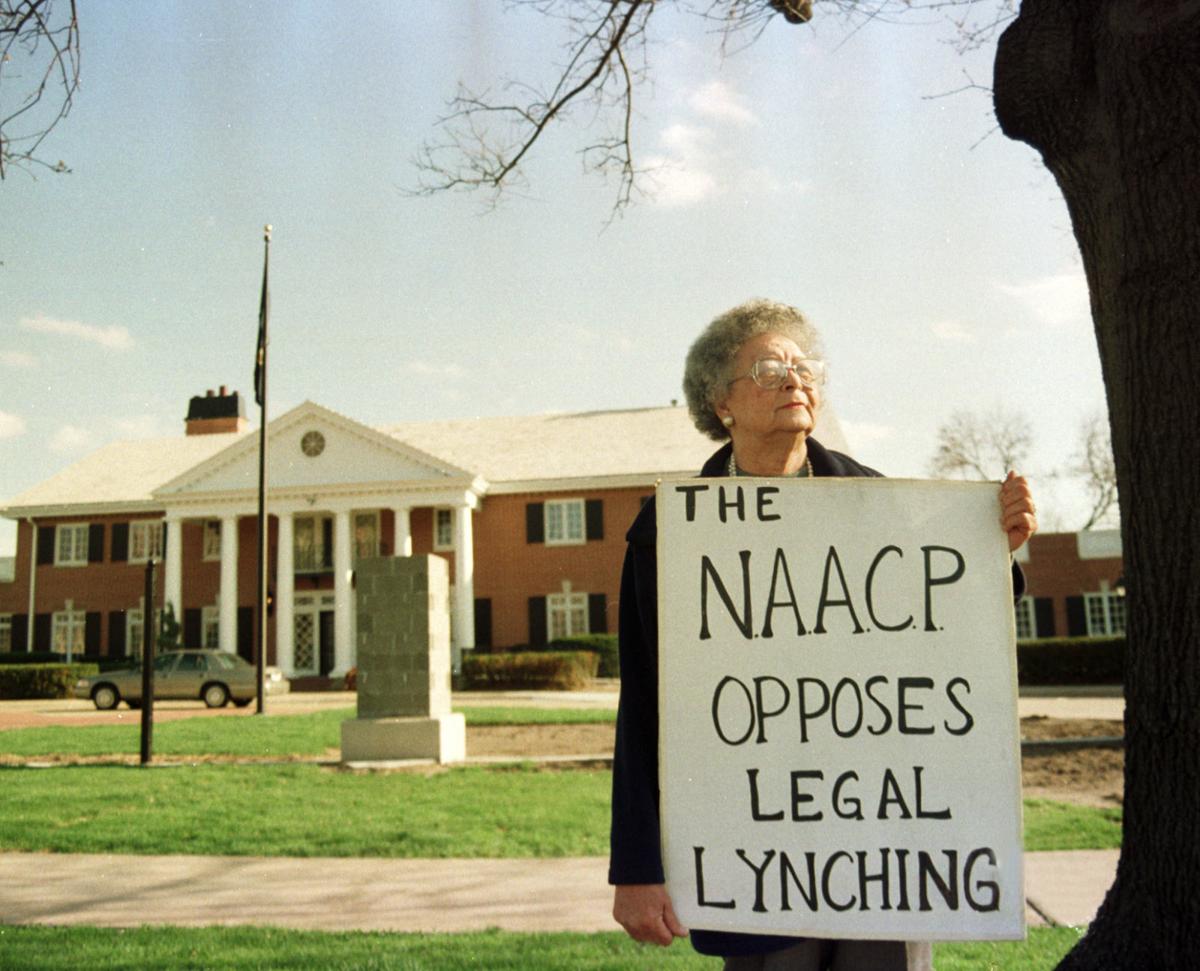Cindy Lange-Kubick: Lincoln, the residence of Dr. Leola Bullock, standing on the high ground of civil rights
Leola Bullock held a vigil on the lawn of the Governor's Mansion in April 1999 to support a moratorium of the death penalty.
You can see her life’s passion in all the places Leola Bullock stood her ground.
Week after week, year after year, in front of the governor’s mansion: The NAACP Opposes Legal Lynching.
In the streets leading to the Capitol, captured by cameras and memorialized in newsprint: In Honor of Medgar Evers.
In places of power — legislative hearing rooms and school board meetings and community forums — calling out injustice and discrimination and institutionalized racism.
“Leola seems to be someone who was born committed,” said longtime friend Fran Kaye. “She came up here and looked around and saw what needed to be done and did it. It was born in the bone, so to speak.”
It was the bone-hard resolve of a black woman from the South determined to make change in a mostly white Midwestern town.
The woman who cautioned: “Never give up. The struggle is always going to be there, but with struggle you find out who you are.”
And she didn’t give up. Not in the short term, when she arrived in 1950 with her husband, Hugh, and found work hard to come by.
Not in the sorrow that followed the death of Martin Luther King Jr.
Not in the six decades she and Hugh, her quiet comrade-in-arms, called Lincoln home.
Days before she died in 2010, Bullock pleaded with her doctor to hurry his exam. She had a meeting to get to and she didn’t want to be late.
She'd wanted to attend a meeting of the Mayor's Multicultural Advisory Committee and get a civil rights director position reinstated.
“She just never stopped,” said Journal Star reporter JoAnne Young. “Right up to the day she went into the hospital, she was going to meetings and advocating for issues.”
Young accompanied Leola and Hugh Bullock on a weeklong trip to her Mississippi hometown in 2004, six years before the 81-year-old died following surgery.
The reporter wrote a profile of the velvet-gloved civil rights activist, describing a Sunday morning in the century-old church where Bullock had worshipped as a child. The grandmother with the gray Afro, staring at a white Jesus on the sanctuary wall all those years later.
“She grew up believing this image was the true one,” Young wrote, “but now she knows the face is in the eye of the beholder.
“It can be shades of brown or black, like those in the Last Supper hanging in her living room in Lincoln, where … she and her husband have shared a long marriage, raised a daughter and nurtured two grandchildren. Where she’s represented her community by asking tough questions, protesting and being persistent. Where she’s made her mark stressing education.”
The trip to Mississippi was a highlight of her career, the veteran reporter said last week. “All the way down and all the way back, we got to hear their stories.”
The N-word hurled at Bullock as a 5-year-old at a parade. The segregated schools and separate entrances and more.
“Things we (white people) would never go through and she was positive anyway.”
When she got to Lincoln, she protested at the lunch counter at Kresge’s, in solidarity with her sisters and brothers in the South.
She protested discriminatory practices at Lincoln’s department stores and became the first black employee at Gold’s, where she stocked shelves and sold magazines. Later, she’d spend 15 years as a clerical assistant in NET’s instructional library.
She was a staple at Newman United Methodist Church and the Malone Community Center — where she nurtured children who called her Mama Bullock.
She led the local chapter of the NAACP and started the Association of Black Citizens, a group that protested police department actions toward African-Americans and eventually led to the Lincoln Police Review Board.
She took on education — unequal opportunities, disparities in discipline, children’s books that portrayed African-Americans in stereotypical fashion and worse.
She formed Concerned Citizens for Truth in Education. She was a member of Nebraskans Against the Death Penalty and fought for the release of Mondo we Langa and Ed Poindexter, declared political prisoners by Amnesty International.
“She just waded into everything,” her friend and fellow activist Kaye said. “She was very much working for her daughter and grandchildren.”
She was the grandmother who made cheesecake for her granddaughter, Tenia, and Rice Krispie bars for her grandson, Tyler, in the stands at all their sporting events growing up. The grandmother who was the catalyst behind the annual Dr. Martin Luther King Jr. Youth Rally & March, now in its 23rd year.
Brittney Hodges-Bolkovac remembers Bullock returning to talk to each year’s participants.
“To be able to see that this one individual had the drive and the passion to get that started was inspiring.”
Bullock was soft-spoken, said Hodges-Bolkovac, now a teacher. “But she was kind of like that grandma who cusses. She was a real person who laid it out there and didn’t sugarcoat the experiences.”
Bullock’s honors were endless, and one was particularly sweet — an honorary doctorate from Doane College.
Kaye remembers calling her home in Havelock, Hugh answering on the other end: "This is the residence of Dr. Leola Bullock."
The proud husband of a woman who stood her ground and lifted up the sky.
Reach the writer at 402-473-7218 or clangekubick@journalstar.com.
On Twitter @TheRealCLK.










